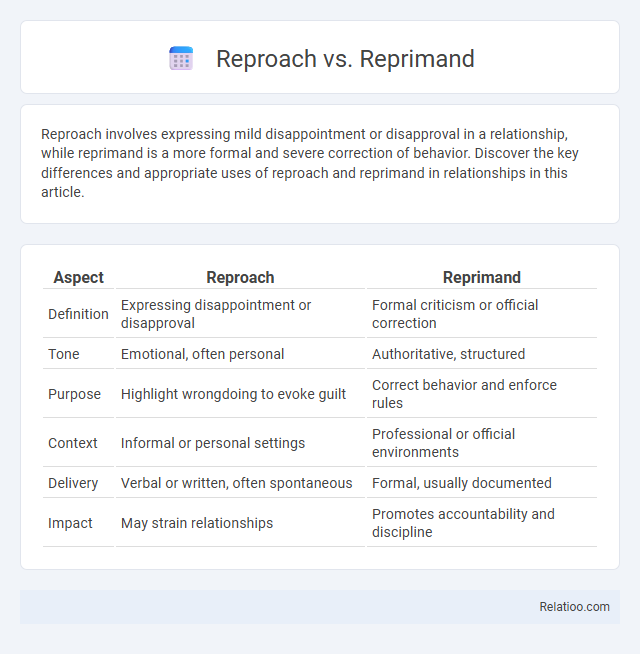Reproach involves expressing mild disappointment or disapproval in a relationship, while reprimand is a more formal and severe correction of behavior. Discover the key differences and appropriate uses of reproach and reprimand in relationships in this article.
Table of Comparison
| Aspect | Reproach | Reprimand |
|---|---|---|
| Definition | Expressing disappointment or disapproval | Formal criticism or official correction |
| Tone | Emotional, often personal | Authoritative, structured |
| Purpose | Highlight wrongdoing to evoke guilt | Correct behavior and enforce rules |
| Context | Informal or personal settings | Professional or official environments |
| Delivery | Verbal or written, often spontaneous | Formal, usually documented |
| Impact | May strain relationships | Promotes accountability and discipline |
Understanding Reproach and Reprimand
Understanding reproach and reprimand centers on recognizing their distinct emotional and disciplinary tones; reproach expresses disappointment or disapproval often in a personal context, while reprimand is a formal, authoritative correction typically issued in professional or organizational settings. Your ability to differentiate these terms enhances clarity in communication, ensuring that feedback is both appropriate and effective. Mastering the nuanced use of reproach and reprimand can improve interpersonal relationships and maintain workplace discipline.
Definition of Reproach
Reproach means expressing disappointment or disapproval toward someone for a fault or mistake, often reflecting a sense of blame or shame. A reprimand, in contrast, is a formal or official scolding typically given by a person in authority. Your understanding of reproach helps distinguish it as an emotional expression of dissatisfaction, whereas reprimand is more structured and disciplinary.
Definition of Reprimand
A reprimand is a formal expression of disapproval often given by an authority figure in response to unacceptable behavior, typically documented and intended to correct future actions. Unlike reproach, which can be informal and emotional, a reprimand serves a disciplinary function within professional or organizational settings. Understanding the definition of reprimand helps you recognize its role in enforcing rules and maintaining standards.
Key Differences Between Reproach and Reprimand
Reproach involves expressing disappointment or disapproval indirectly, often through criticism or blaming, reflecting a more emotional response to someone's actions. Reprimand is a formal, authoritative rebuke usually given in professional or institutional settings, aiming to correct behavior through official reprimanding. The key difference lies in the tone and context: reproach can be personal and informal, while reprimand is structured and disciplinary.
Contexts Where Reproach is Used
Reproach is commonly used in personal or emotional contexts where disappointment or blame is expressed subtly, often reflecting moral or relational criticism. Unlike reprimand, which carries a formal or authoritative tone typically found in professional or disciplinary settings, reproach highlights feelings of regret or disapproval in interpersonal interactions. It is frequently employed in contexts involving family, friendships, or ethical judgments to convey guilt or remorse without the overt severity of a reprimand.
Contexts Where Reprimand is Appropriate
A reprimand is appropriate in formal or professional settings where authoritative correction is necessary, such as workplaces or schools, to address specific unacceptable behaviors or performance issues. Unlike a reproach, which conveys disappointment or criticism and can be informal or emotional, a reprimand serves as an official warning or disciplinary action. Reproach is often used in personal or relational contexts to express disapproval without necessarily imposing formal consequences.
Tone and Intensity: Reproach vs Reprimand
Reproach typically conveys a softer, more personal tone often implying disappointment or mild blame, whereas reprimand carries a stronger, formal tone indicating official or serious disapproval. The intensity of a reprimand is higher, often used in professional or authoritative contexts to correct behavior, while reproach might be expressed in personal relationships with an emotional undertone. Understanding these differences is crucial for effective communication in both personal and professional settings.
Impact on Workplace Communication
Reproach in workplace communication signals disapproval and can create emotional distance, potentially leading to decreased morale and trust among team members. Reprimand carries a formal tone, typically issued by supervisors, and serves to correct behavior while maintaining authority but may increase stress or fear if not balanced with positive feedback. Reproof involves courteous criticism aimed at encouraging improvement, fostering an environment of constructive dialogue and collaboration that supports professional growth and effective team dynamics.
Using Reproach and Reprimand Effectively
Using reproach effectively involves expressing mild disapproval or disappointment to encourage reflection without damaging relationships. Reprimand requires a firmer tone, often issued formally or by an authority, to correct behavior clearly and assertively. Understanding when to use reproach versus reprimand ensures communication is appropriate, enhancing accountability while maintaining respect.
Common Misconceptions About Reproach and Reprimand
Reproach and reprimand are often confused, but reproach typically conveys disapproval or disappointment without formal authority, while a reprimand is an official expression of criticism usually given by someone in a position of power. Common misconceptions include assuming that any negative feedback is a reprimand, whereas reproach can be more personal and emotional, lacking the formal context of a reprimand. Understanding the distinction helps clarify the tone and intent behind criticism in both personal and professional interactions.

Infographic: Reproach vs Reprimand
 relatioo.com
relatioo.com